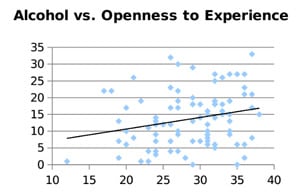
Assistant Professor of Psychology Shane T. Mueller is proud to announce the publication of the second volume of the “Journal of Midwest Undergraduate Behavioral Research (JMUBR)“, which contains short research papers reporting the results of the research conducted in Psych 3001 during Spring semester 2014. JUMBR is edited by Shane Mueller.
Some highlights of their findings in Volume II:
* Although people will use stereotypes based on age and gender when assigning perceived personality traits based on pictures alone, they are able to ignore these factors when making simulated hiring decisions (Evans, Schreifels, & Eby, 2014).
* Based on a survey of members of social media communities related to alcohol use, abuse, and recovery, Panasiewicz, Santerre, and LaFave (2014) found consistent correlations between an alcohol risk self-assessment (AUDIT) and two personality factors (positive with openness to experience; negative with conscientiousness)
* Nelson and Coon (2014) examined versions of the ‘Trolley’ study moral dilemma and showed that, although this task is used frequently to identify moral decisions and attitudes, people’s responses to the question are unrelated to many real-life moral behaviors (e.g., giving to charity) and to responses on real-world examples that have a similar form (sacrificing the good of the few for the good of the many).
* In an effort to examine the reasons both undergraduates and graduate students give for enrolling in graduate school (specifically at MTU), Kemppainen, Suokos, and Wetelainen (2014) found that values and reasons appear to differ between these two groups. Importantly, successful graduate students were as likely to be attracted by the depth of learning offered as by the prospect of a job, whereas undergraduates were more interested in graduate school as an avenue toward a job.
*Jordon and Boardman (2014) examined how physical activity impacts the mental capacity of collegiate athletes. Results indicated that as athletes proceed during their workout, the speed of some of their cognitive skills increases, perhaps at the cost of greater errors.
*Harter, Mauer, and Yovich (2014) looked at prior ADHD diagnosis, responses to the ADHD Adult self-report scale, and cognitive attention tasks. Although in this sample of mostly young adults without prior ADHD diagnosis showed little relationship between measures, results indicate that the scores of a significant proportion (greater than 90%) of college students on the ADHD self-report scale place them in the “warning zone” for ADHD diagnosis.